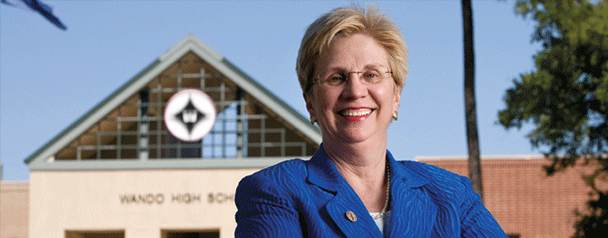
Lucy Garrett Beckham ’70 knows formulas. A former mathematics teacher, Beckham can discuss the finer points of the quadratic equation, Boolean addition, remainder theorem, Ohm’s law or infinite nested square roots. But perhaps the greatest formula she has come across is the one she is writing and perfecting now: what makes a school great.
Her formula is startling in its simplicity. “It’s about opportunities,” says Beckham. “That’s it – students need opportunities.”
But from an execution standpoint, the “opportunity” formula has more sides and angles than a hecatohedron (that’s an object with 100 sides, for us laymen). And leave it to a mathematician like Beckham to be undaunted by such a challenge.
In 1998, when she became principal of Wando High School in Mt. Pleasant, S.C., Beckham walked into a building and a school in disarray. The facility and grounds certainly looked and felt institutional – think prison, not school. So the first thing she did was begin the Herculean task of cleaning it all up and transforming it into something special.
“A school has to be inviting … clean,” Beckham says. “Then, students are going to react more positively to the place. They’re going to be proud of their school. And that’s a pretty good starting point for getting them to buy into their education.”
Next, Beckham began assembling a leadership team and faculty of gifted teachers. “The strength of a school is in the classroom,” she emphasizes. “As a principal, you must hire the right people. Then, you need to create programs and activities, such as clubs, athletics and performing arts organizations, that serve as hooks for getting the students to believe in their school and their personal educational development.”
Her success at creating a wide array of educational opportunities has not gone unnoticed. The recipient of many honors over the years, from teacher of the year to state administrator of the year, Beckham was most recently named the 2010 MetLife/NASSP National High School Principal of the Year.
Not too shabby for someone in a state that historically lacks a commitment to (and funding for) public education.
The judging panel in Washington, D.C., marveled at her ability to make South Carolina’s largest high school – with a student body of 3,200 and a staff of 300 – a national model for educational excellence. They applauded her pragmatic approach to leadership, her belief in incorporating new technology into the classroom and her passion for education.
For Beckham, education is not for the faint of heart or for those looking to get rich – in a monetary sense.
“Teaching is an intense experience,” Beckham explains. “It’s also an extraordinary time commitment. Work doesn’t end at 3:30. Good teachers are at it weekends, nights and holidays. And the best educators are the ones continually trying to improve, maybe it’s reimagining last semester’s lesson plan or taking graduate classes at night, or perhaps its learning a new software program to change up the way you deliver the information. One thing is for sure, technology is revolutionizing education – and the revolution is not over.”
So why do it? Why enter a career that is always changing and requires you to constantly change with it? Why take a job that, at times, is thankless and doesn’t pay top dollar?
Maybe it’s in your DNA. For Beckham, she came from a family of educators and even passed the torch to her own children.
Or maybe it’s because working in education – seeing firsthand the “aha” moments register in your students’ eyes – is unlike any other professional experience out there.
“It’s hard to describe – the joy of teaching,” Beckham admits, her own eyes sparkling. “The classroom is such a special place. It took a lot for me to jump into the administration side of things. But whether you are running a classroom or running a school, the power of education is evident. Here, you have the ability to positively impact not just one student, but entire families – in fact, you may even affect generations of people through your teaching and example.”
And Beckham’s example is raising the bar for what is possible in public education. “If you set high expectations,” she believes, “the kids will meet them, even exceed them.
“Every child can learn,” she adds. “You just need the right support, high quality of instruction and, of course, opportunity.”
And that’s a formula every educator should know by heart.
– Mark Berry
photo by Leslie McKellar




